Maybe you like to travel?
- 10-hour flights
- Jet lag
- Wasted time at the airports
I still like to travel despite all of that.
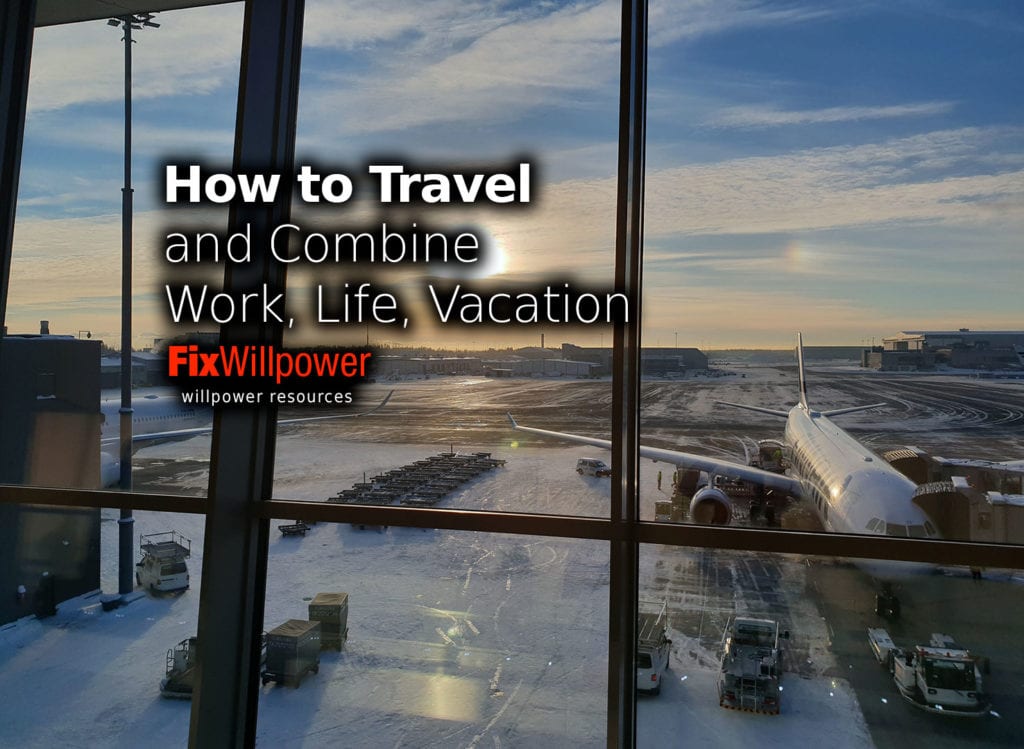
I usually want my travels to have more meaning than just laying on the beach or racing through the checklist of sights to see. Here’s a great post from Ryan Holiday published on Tim Ferriss’s blog. How to Travel: 21 Contrarian Rules
All this got me thinking about what I want out of travel and my life.
What follows are notes of my planning session to figure out how to combine work, life, and vacation. I want to travel the world. For that, I need income.
Well, I already travel, but let’s find out how to optimize the process. The goal is to make travel less disruptive to other areas of your life.
My take may be most useful for speakers, coaches, but other knowledge workers can also find some ideas in there.
Before I go on a few words of caution:
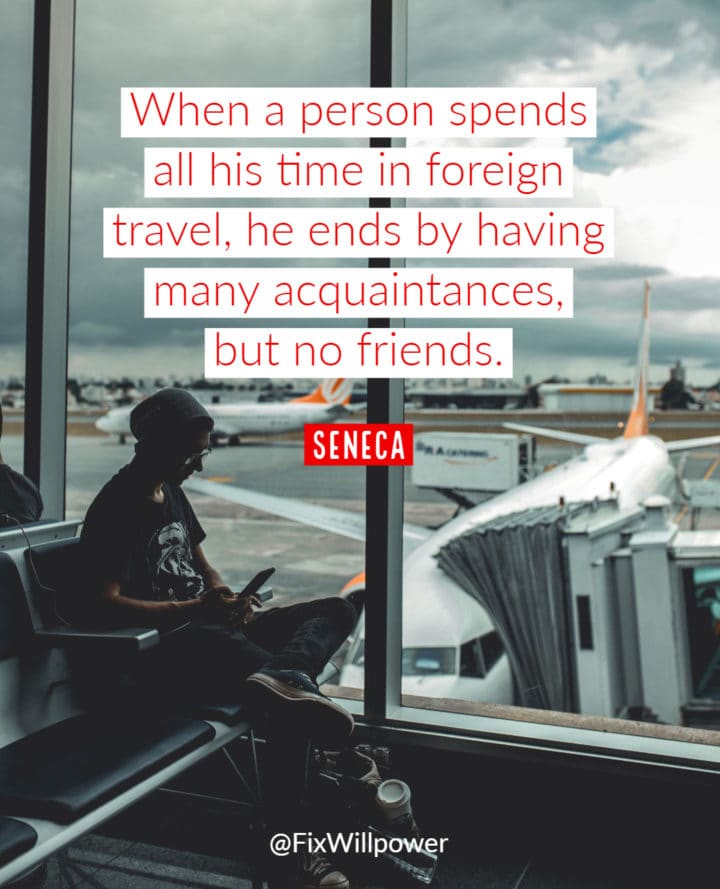
When a person spends all his time in foreign travel, he ends by having many acquaintances, but no friends. ~ Seneca
There is nothing inherently valuable in travel
No matter how hard the true believers try to convince us. […] saving your money, plotting your time off work or school, diligently tracking your frequent flyer miles and taking a hostel tour of Europe or Asia on budget may be the wrong way to think about it. ~ Ryan Holiday
Travel should not be an escape
Travel should be part of your life.
No better or no worse than the rest of your life. If you are so dissatisfied with what you do or where you live, that you spend weeks and months figuring out how to get a few days away from either, that should be a wake-up call. There’s a big difference between *wanting* a change in scenery and *needing* to run away from a prison of your own making. ~ Tim Ferriss
How to travel combining work and life?
Usually, your daily routine breaks when traveling. But what to do if you enjoy traveling?
Broken routine means that many of the tasks that happen seamlessly during the day when you’re at home get disrupted. As a result, your efficiency drops considerably. There are 3 main questions:
1. How to be productive while traveling?
Another challenge is the long-term travel. When you want to travel for months, then skipping work is usually not an option.
2. What type of work lets you travel extensively?
You must find answers to these two questions, and then you can embark on long-term travel. The third question is for people who have kids as I do.
3. How to take care of the children during long-term travel?
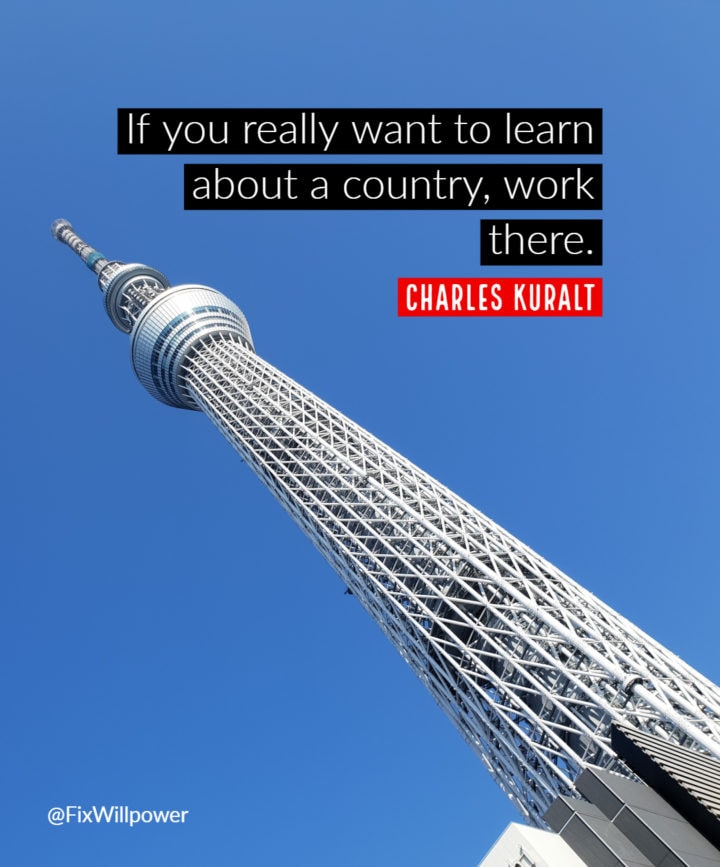
If you really want to learn about a country, work there. ~ Charles Kuralt
1. What to do about work and productivity?
One of the key ideas to make travel more productive is to create your schedule in advance.
Assume the mindset of work travel, not just fun and games. To get this mindset going, then maybe let’s flip the whole idea on its head. When traveling, focus on working as much as you can, and see if you can squeeze in some entertainment.
Plan for the working days and put it in your calendar.
When you get really good at work travel mindset, then you may slowly start putting more leisure time into your days. In the end, you should have a schedule similar to the one at home. Maybe just a little less work.
Here’s how you can split the time between the most important parts of the day:
- 8h of sleep
- 7h of work
- 7h of free time
- 2h for commuting and other mundane activities.
Effective time management means that one criterion for selecting hotels is the checkout time. Is it possible to get a free late checkout in the afternoon?
Also, my experience shows that you should stay in one hotel for several days. If you move every day, you will lose a lot of time to nitty-gritty and commute.
Full work days can happen only when there’s at least one more day left at the hotel.
Hard work requires focus, but travel distracts.
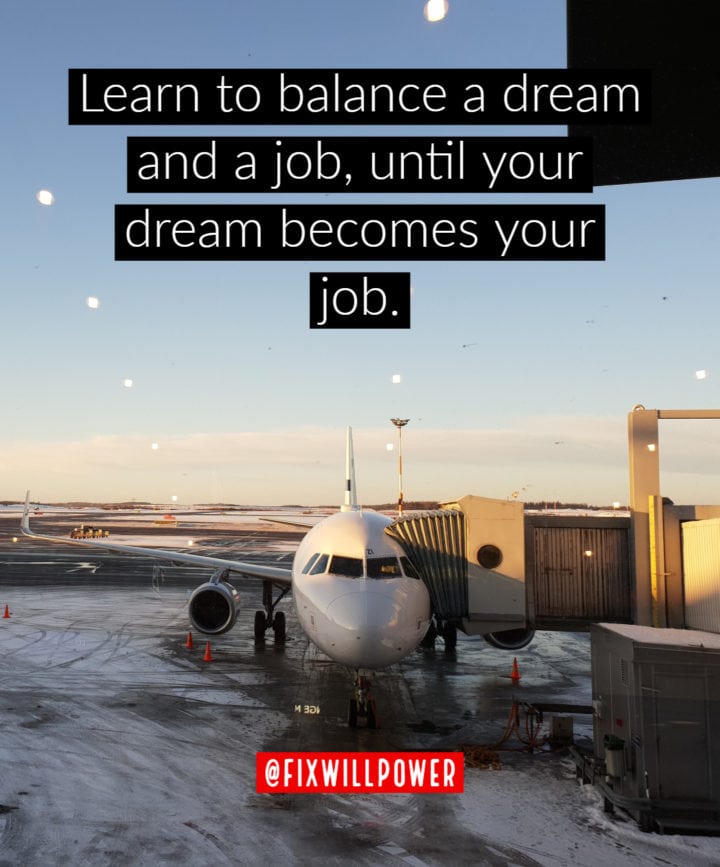
Learn to balance a dream and a job, until your dream becomes your job. ~ Anonymous
Working on the airplane
Work on the plane! The most productive work you can do on the plane is
- Reading and taking notes
- Writing
- Listening to audiobooks or watching downloaded videos for learning
- Having a workshop with a fellow traveler (if flying with a colleague)
You need a computer that can play videos for at least 5 hours to make this work on intercontinental flights. Or business class with power outlets. Business-class also adds a possibility to use the network.

However, flights are an environment where you have enough isolation to do deep work.
There may be some distractions on the plane when traveling with companions, but you can manage this with minimal loss of productive time.
Vacationing
When you are on vacation, then you may have companions.
You should squeeze work into the morning and try to complete the most important tasks. The morning routine should be around 2 hours. Block that time and manage the expectations of your companions.
If you don’t let others know that you are working, then you will get anxious. That anxiousness deteriorates your productivity.
Working for over 3 hours a day during vacation is insane for most people. But I have a problem with that. If I don’t work for several days in a row, then it’s incredibly hard for me to get going again.
It’s a habit like running or going to the gym. When you skip a week, your fitness level drops, and it’s really hard to get going again.
On vacation, you may share a room with someone. That someone is making noises, moving around the room, asking when you will be ready. All this amounts to lower performance and a slower pace.
When you travel, make sure you have a personal emergency fund for a rainy day.
No time for deep work
Deep work needs hours on uninterrupted time. Uninterrupted time is hard to achieve on vacation.
What could be the solution that lets you do deep work?
Going to bed early and waking up early to work when others sleep.
Rising early can give you up to 3 hours of time. You can spend these 3 hours on the key tasks you want to complete that day. But these tasks are not deep work. Alternatively, you could use the whole 3-hour session to do something important.
You can stay in a hotel every few days.
Staying in the hotel is not possible when you are responsible for transportation or activities for your companions. Even if it’s possible with another driver, then your companions will not understand. Situations and solutions for staying in for a day:
- With a companion on checkout days: Wake up early and work 2 hours before check out. Plus 2 hours for exercise and breakfast. This means 6am wake-up call and 10pm sleep time and no alcohol. You can work 3 hours in this case if there’s no exercise.
- With a companion on extended stays: Sleep at 12am. Wake up at 8am. Work for 3 hours, exercise and breakfast for 2 hours. Total of 5 hours and get out of the hotel at 1pm.
- With a companion full workday: wake up at 9am, exercise and breakfast for 2 hours. Work from 11am to 5pm. Go out to town.
These options are possible when you travel as a couple. If there are children involved, then the full-day option is usually not possible, but the first 2 are. These options also work with a larger group when you are not responsible for the transportation of the group.
It doesn’t work in situations when traveling with a smaller group where being in the group is the key. These trips need to be short, maybe 5 to 7 days.
All these days need at least 2 hours of work to keep the momentum going.
How many hours a week should you work?
The most important question is how many hours should you work per week?
Here’s how I want to budget my time. Often unsuccessfully.
When I have live talks, then the hours tend to stretch to 50 hours per week. Although I like that, it’s not sustainable.

My goal is to work 32 hours per week.
During that week, you need to make enough money to sustain your desired lifestyle and save something for a rainy day. The hourly rate would be your income X divided by 32 per hour. If that is a reasonable hourly rate, then you are good to go. The working hours should break down as follows:
How I schedule for weeks without live talks:
- Saturday: writing, email, updating the website. Total 2 hours.
- Sunday: writing, email, updating the website. Total 2 hours in the morning if possible.
- Weekdays: writing, email, updating the website in 2 hours as usual + 3 hours of deep work and 1 hour of something completely different. Total 6 hours per day and 30 hours per workweek.
All this sums up to an acceptable 34 hours per week. At least 25 to 30 percent less than I am doing now.
Additionally, there are days with live performances on seminars and conferences. There are usually three types of events: short talk, half-day and a full day. The time budget for a full-day event is 10 hours.
- Writing, updating, and email 2 hours
- Live event 7 hours
- Other stuff 1 hour
As I have experienced in the past, 10-hour days are somewhat tiring. You can’t sustain it for extended periods. The longest stretches have been 6 days. The problem is that other work piles up and causes problems.
The half-day event time budget is simpler to manage
- Writing, updating, and email for 2 hours
- Live event 4 hours
- Other stuff 2 hours
A total of 8 hours is easy to maintain, and leaves room for other tasks. If you can charge enough for such a day, then the total for a week of events would take your income to a comfortable level. You may have other income sources, then this might be one of the best ideas to spend your live event time.

My normal life is like being on holiday. ~ Valentino Rossi
Special kind of work travel: conferences
The problem with conferences is that if you want to get the content, then your time is full from 10 to 16 or even 17. Focusing on the talks means that you have time only before the start in the morning or after the event in the evening.
Another option is working through the conference and taking part only in networking sessions. However, not listening to the talks will make networking and approaching speakers more difficult.
That’s why it may be a good idea to avoid conferences.
You spend money, you lose work, and you get little in return if you don’t network. So, attending the conferences is meaningful only for the following reasons:
- You are the speaker
- You are the organizer
- You have a clear networking agenda
- You are trying to skip work at the employer’s expense
Say “yes” to conferences if any of the above is true. In all other cases, say “no” to conferences.
2. What type of work lets you travel?
- Investing
- Online courses
- Writing
- Programming
- Translating
- Consulting
- (Web) design
- E-commerce
- Accounting
- Youtubing
And then there are the businesses you can’t take online.
- Car repair
- Store clerk and all forms of brick and mortar stores
- Dentist
- Gardner
- Dry cleaning
- Lawyers in court
- Construction
- Taxi, Uber, Bolt, and other similar services
- Day care for kids
- Factory work
- Repairmen
Managing an offline business while traveling
All the professions and activities above have to happen offline. If you are the person providing the actual service, then you have to be there in contact with the customer.
If you are not a specialist providing the service, then you can manage an offline business without being there in person. For example, you could run a car repair shop without setting a foot on the premises. You can manage the bookings, supply spare parts, pay salaries, have meetings with employees.
You probably need a second in command who will take care of the face-to-face meetings with customers and employees.
A workable solution could be a partnership where partners can travel extensively one at a time. They would still work while traveling, but the offline partner takes care of the things not possible online.
Providing offline services while traveling
One service long-term travelers offer is teaching a language class. If your long-term travel includes staying in one location for months, then you can then you can offer your services to locals.
There are a lot of services you can offer when you settle down for three to six months.
The main obstacle is the tools you need. You could offer car repair and landscaping if you have access to tools you need.
Then there are the usual immigrant worker jobs of waiting tables, delivery, and taxi driver.
The possibilities are endless if you have the skills that people want. Just two examples here:
You could travel the world as a photographer. You will travel to locations where your clients live. You will have sessions with them and then move on. The shooting sessions could be about anything. Photoshoots for ad agencies, weddings, magazines, and other work. You can arrange several shoots in one area and stay for longer.
Maybe you are an excellent chef? You don’t have to limit yourself to a restaurant with a physical location. You could be like a band on tour. You will travel from location to location and then have several pre-booked “shows” in every location as home restaurants or places where you can rent entire kitchen for yourself.
The possibilities are endlessly exciting if you are creative in going through the obstacles.
3. How to take care of the kids
If your kids are preschoolers, then it’s easy. Well, relatively easier as you don’t have to worry about school.
When your kids are between 7 and 18, then extended travel means you have to homeschool them. Some people got the understanding of how much kids learn per day during the coronavirus lockdown.
It can be anywhere from 4 to 10 hour per day.
The classes are the easy part.
One valuable aspect of attending school is the development of social skills in an adult-free environment.
But how to make home schooling a success is something that needs an entire article or better yet a book.
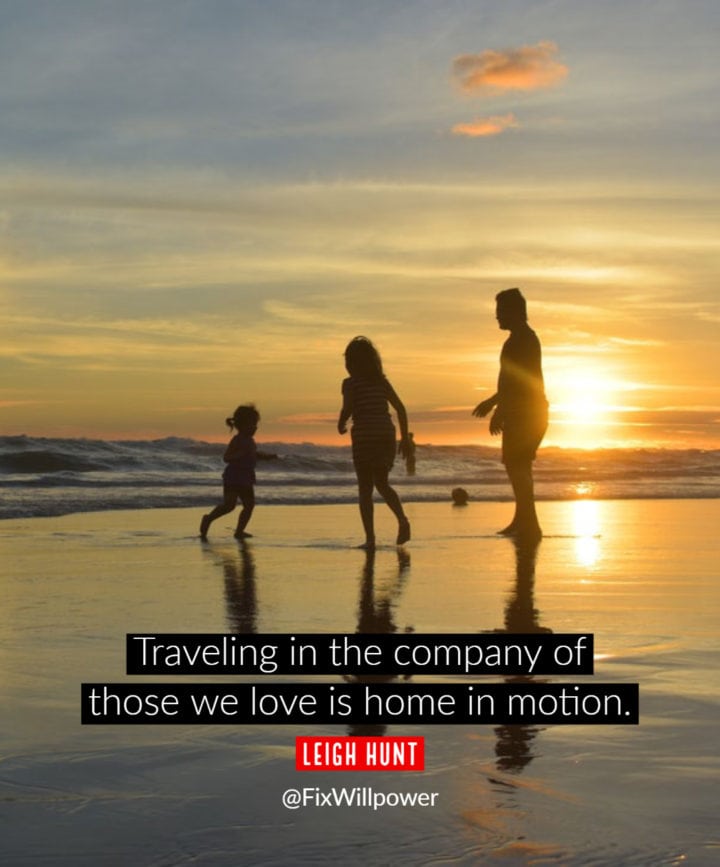
Traveling in the company of those we love is home in motion. ~ Leigh Hunt
The value of the in-person meeting
One downside of the extensive travel life-style for business is the lack of in-person meetings.
We can conduct most business over the internet. 100 years ago, people conducted business via hand-written snail mail. But in-person meetings have a ton of value. Especially in sales meetings.
In sales phone calls are better than email. Video conferences are better than phone calls. And last, in-person meetings beat them all out of the water.
But this does not mean you have to sell in-person. If you have a low-touch online service, then you may never meet a client in person.
How much do I want to travel?
Here’s a list of events I would like to squeeze in for a year:
- Snowboarding in January with my companions and February with the kids adds up to about 3 weeks
- One trip with kids to somewhere fun for 1 week
- 2 additional trips with my companions for a week each add 2 weeks of vacation time.
- Add 2 weeks for random breaks and short trips.
All these trips will come to 8 weeks of vacation time per year.
On the flip side, I don’t want to travel every few days. The best option would be to go to a location and spend several weeks up to a month in one place. Extended stay minimizes the friction cost of traveling from place to place.
Possible scenarios in this travel format are:
- January to March in the Alps. Driving to the location from my home country in my own car. Changing locations in the Alps every two or 3 weeks.
- Fly to Florida in March, and spend 2 months in Key West. March, April or May.
- Now the time is ready for summer in Northern Europe June, July, and maybe August are great months to spend in here.
- In September, there should be skiing possible on the southern hemisphere. Chile, New Zealand might be options for summer snow fun. The possible time-frame is 2 August and September.
- After that head to South Pacific. Fiji, Tahiti, and other Polynesian islands. Spend 2 months in this location. Pacific session ending at the end of November.
- Now the time is ripe for December in at home for Christmas and New Year’s.
All this has 2 conditions to make it possible:
- You don’t have kids, or they are already independent and leave home.
- Income level that sustains this lifestyle + growing investment portfolio.
What do these 2 conditions mean for me? I have about 5 years to increase my income levels. That’s when the kids leave the house.
Now take out your notebook or spreadsheet and do a quick calculation. How much would you like to travel and how to finance it.
![Read more about the article Building Your Network [SLIDES]](https://fixwillpower.com/wp-content/uploads/building-your-network-429x314.jpg)
![Read more about the article Call An Old Friend to Keep in Touch and Build Your Network [STEPS]](https://fixwillpower.com/wp-content/uploads/call-an-old-friend-429x314.jpg)
![Read more about the article 13 Tips and Quotes for Entrepreneurs [Slides+Video]](https://fixwillpower.com/wp-content/uploads/entrepreneur-quotes-cover-429x314.jpg)
![Read more about the article The power of vulnerability: Brené Brown [VIDEO]](https://fixwillpower.com/wp-content/uploads/vulnerability-worthiness-429x314.jpg)
Pingback: Tiered Personal Emergency Fund to Make You Bulletproof [in 2020] - @FixWillpower